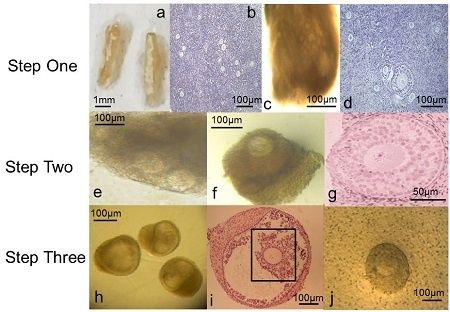The gynecologist said the new procedure could potentially allow women to produce hundreds or even thousands of eggs.
Traditional pregnancies and fertilization may become a thing of the past after scientists announced in a report Friday the successful growth of a human egg to maturity in the nurturing environment of a petri dish.
RELATED:
China Clones First Monkeys, Paving Way for Humans to Follow?
Scientists from the Scottish University of Edinburgh took 10 ovarian tissue samples from women in their late 20s and 30s and nurtured the collection of egg cells over an accelerated amount of time with a variety of supplements.
The study was broken into four parts and, of the surviving 48 eggs, nine reached full maturity in only 22 days: an impressive time period compared to the body's normal five-month process.
This new discovery could provide procreative opportunities to women at risk of premature fertility loss, a common side-effect of chemotherapy or radiotherapy.
Stuart Lavery, a consultant gynecologist at Hammersmith Hospital, said: "The patient has to go through the quick cycle of IVF before their chemo, so it can sometimes delay things, and also you may only get 15 eggs or so because IVF is so inefficient, only having 10 or 15 eggs is not going to guarantee them a baby."

The gynecologist said the new procedure could potentially allow women to produce hundreds or even thousands of eggs.
Researchers say young girls who develop cancer prior to reaching puberty and therefore have not begun to produce eggs can also protect their organs by preserving a small piece of ovarian tissue which can be replaced at a later date.
However, health experts allege that the risk of reintroducing cancer cells are high.
"(For young girls) that is the only option they have to preserve their fertility," said co-author Professor Evelyn Telfer.
RELATED:
Millions of Viruses Fall From Earth's Atmosphere Every Day: Study
Telfer, however, expects it will be several years before the process is widely accepted and incorporated into medical procedures. Additional tests are required to ensure mature eggs are normal and the process is safe for patients. Scientists are also unsure that combining a sperm cell would result in a healthy embryo.
"When you have got the eggs, of course you would have no contaminating cells – hopefully, it would be an embryo that you would be implanting back in," said Telfer.
"The next step would be to try and fertilize these eggs and then to test the embryos that were produced, and then to go back and improve each of the steps."
Still, stem cell biologist at Magee-Womens Research Institute, Kyle Orwig, said the achievement is "extraordinarily important: it has real potential for application. We already have the patients."